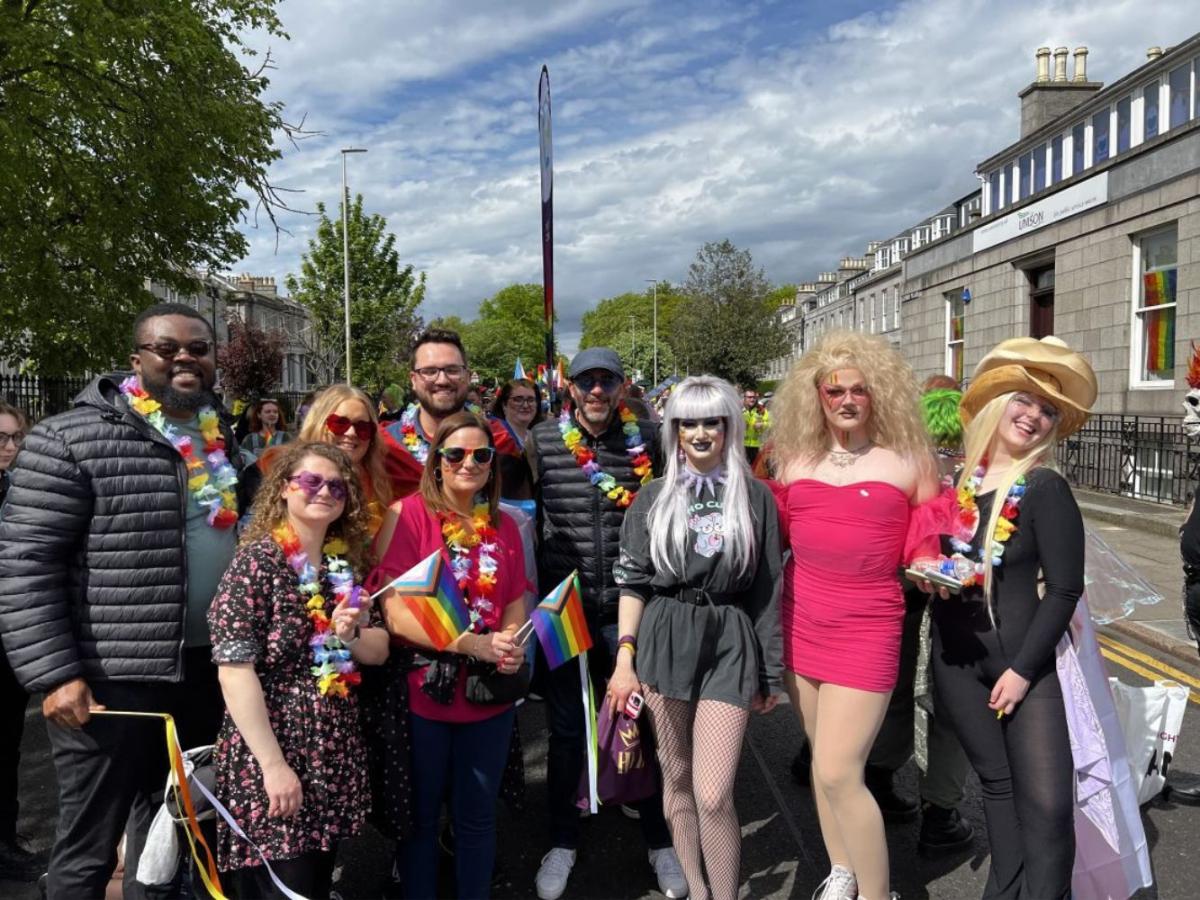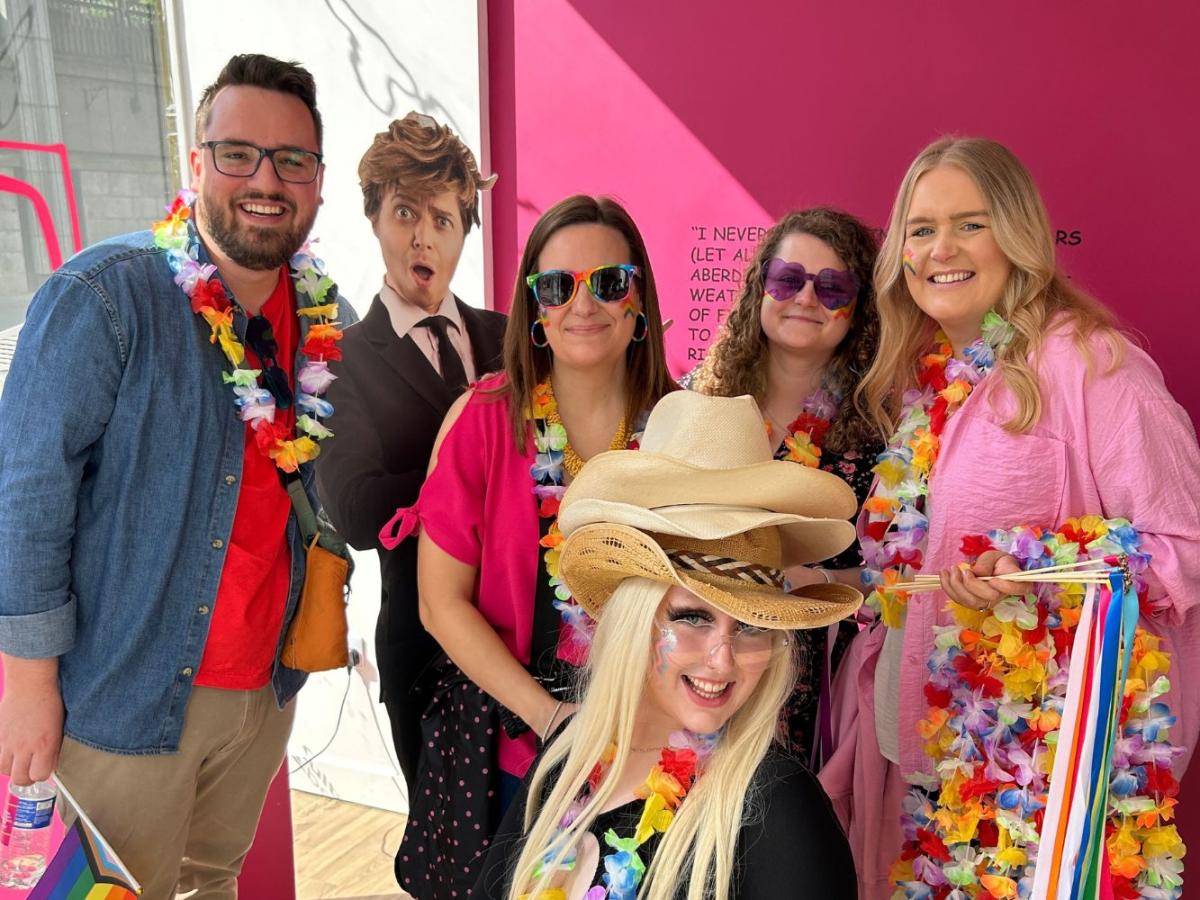Being proud at RGU
To celebrate Pride Month, Equality Champion for Sexual Orientation Daniel Massie shares what the celebration means to him and some insights on allyship.
When we think about pride, different things may come to mind. We might think of pride as a celebration, or as a protest.
It might conjure images of rainbow flags, glitter, and drag queens on well-decorated floats, or it might make others think of the Stonewall riots and LGBTQ heroes of years gone by. If I’m being honest, and I say this with a bit of trepidation, I feel a bit ambivalent about ’PRIDE’.
I feel a sense of pride in being a gay man. I feel no shame towards who I am, and I celebrate the advances of the LGBTQ community. I recognise my ‘otherness’ and all the wonderful ways this enriches and enhances my life. But sometimes the ‘corporatisation’ of pride makes me a bit uncomfortable. The idea of "pinkwashing" is nothing new, and sometimes I worry that the celebratory aspect of pride, as fabulous as it is, coupled with companies adapting their logos with rainbow colours and sponsoring floats at pride parades, masks a shift away from the spirit of pride.
"... I THINK IT IS MORE IMPORTANT NOW THAN BEFORE THAT WE DON’T ALLOW PRIDE TO PASS BY SOLELY AS A CELEBRATION BUT MAINTAIN ELEMENTS OF RESISTANCE."
For me, at its heart, pride should be about standing up and saying that who we were born to be is valid, is right, and is worthy. And while I fully believe this can be done in a fun, celebratory parade (one can never have too much glitter!), I think now more than ever we need to interrogate a bit more fully what pride does, or ought to, stand for.
At a time when the LGBTQ community globally are facing regressive policies, with reporting of hate-crimes on the rise, and life-threating legislation being proposed and passed, it seems now more than ever we need to re-assert our worth, not in spite of our sexuality, or gender identity, but precisely because of it.
I think pride parades are a glorious display of the LGBTQ+ community. They enable us to march in celebration of our lives, our love, and our many ways of being. They also allow others to show support, to advocate for us, and to mark themselves as allies. I don’t want to redefine pride, I am simply speaking from my perspective and making a few observations.
In the current climate which exhibits differing levels of hostility to LGBTQ folk, I think it is more important now than before that we don’t allow pride to pass by solely as a celebration but maintain elements of resistance. We can use a peaceful (indeed celebratory) march to re-assert our worth, to dignify our rights to be who we are, and to live and love publicly and without shame. For me, it is about our intention and the context we are in. We need to know exactly what we are marching in pride parades for.
"It is not solely the responsibility of LGBTQ people to challenge prejudice, it is also the work (and duty!) of an ally to challenge their peers..."
I want to talk a bit about allies: what might it mean to be an ally? As mentioned, we live in conflicting and contradictory times - on one hand LGBTQ rights are under threat and bigots feel emboldened to ratify their prejudices, and on the other LGBTQ representation across media such as films and TV is considerably positive and recurrent.
We have bucketloads of people watching, tweeting about and discussing ‘RuPaul’s Drag Race’, ‘The Eurovision Song Contest’ or the BBC’s newest gay dating show ‘I Kissed a Boy’. This representation is no bad thing, and indeed no mean feat (Drag Race UK serves as a current flagship BBC (The BBC!!) show crossing different demographics). However, I still wonder, at what point does positive representation and unique depictions of LGBTQ people not cut it when it comes to pride and allyship.
Watching these shows and being friends with the LGBTQ community is excellent. But in the spirit of interrogating pride, I think we can slide our ideas of ‘allyship’ under the microscope a bit. One example: I wonder how many gay men have been out and about with straight female friends whose boyfriend might have made homophobic (even subtly so) remarks that go unchallenged. How many times do our supposed ‘allies’ excuse prejudice when it comes from those who they may know and love as something to be tolerated, or looked over?
It isn’t enough to paint a rainbow flag, march in a parade and post about it on Instagram. This is a call to action to people who think themselves ‘allies’ to speak up when its needed, to have the desire, means and confidence to push back against anti-LGBTQ remarks (however subtle they may seem), as I assure you when those remarks land at an LGBTQ person’s feet there are no less hurtful. It is not solely the responsibility of LGBTQ people to challenge prejudice, it is also the work (and duty!) of an ally to challenge their peers and to advocate for the dignity, respect, and worth of their LGBTQ family and friends. It is a shared endeavour.
Being a Staff Equality Champion for Sexual Orientation at RGU affords me a platform to articulate these feelings.
I can advocate for my beliefs, and those of others. I am proud both to be a gay man, and part of the LGBTQ community, and I am equally proud to be part of a university which affords me the privilege of sharing these thoughts as part of Pride Month.


